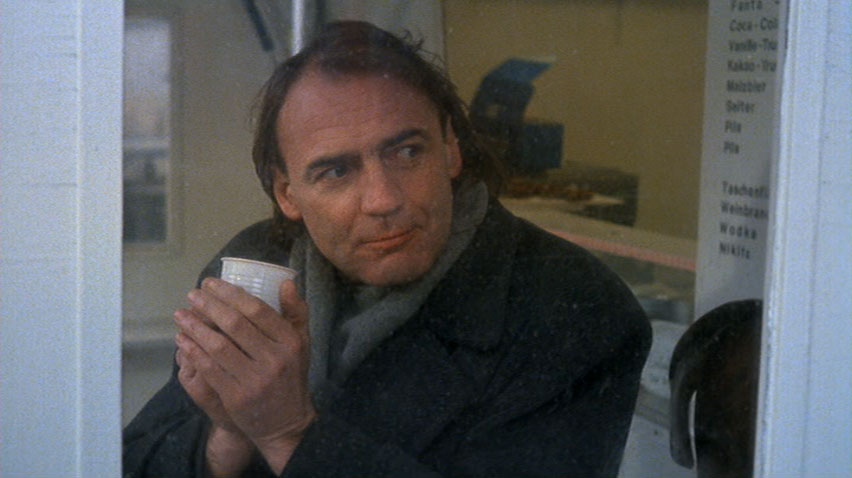Caution: This movie is over thirty years old- there will be spoilers!
Written by Peter Handke and Wim Wenders and directed by Wenders, “Wings of Desire” is a German arthouse fantasy film about two angels stationed in Berlin that observe the inner thoughts and outer actions of the many citizens they choose to monitor at any given moment. The film can be understood in two parts in my opinion. The first half of the film consists of an introduction to how the angels go about their unending time, who they choose to listen to, and who to comfort in small and almost unnoticeable ways. This half illuminates the musings of the soul that these angelic figures eavesdrop on as they witness, observe, and record the thoughts and feelings of thousands in Berlin. The second half comes when Damiel (Bruno Ganz) wanders upon a circus and begins to fall in love with the female trapeze artist Marion (Solveig Dommartin). Afterwards Damiel, whose been observing humanity for thousands of years now, becomes enraptured by the idea of leaving immortality behind for the bittersweet, romantic, and melancholic nature of life. He discusses this idea at length with his angelic counterpart Cassiel (Otto Sander), who seems to dismiss his friend’s fascination with the possibility of living a life with risk in it.

What I love most about this film is it’s balance between the solemn deadpan nature of the Angels’ existence (shown exclusively in black and white) set against the multifaceted and blended world of the living- which is shot in waves of color. This is one of those films that you admittedly have to be in the right mood to digest. It’s more about absorbing the moving imagery and pondering the larger than life questions and ambiguities of life rather than a focused narrative, though there is a through-line of thought taking place. Poetic in nature and more interested in what people aren’t saying, “Wings of desire” shows an angel that is more concerned with what makes a life worth living rather than his own heavenly duties. Or to put it more bluntly, he’s gotten bored and uninterested in the angelic listening gig after a few thousand years. Marion triggers something in him, something that ultimately drives him to give it all up to be with her, to aide her in navigating her own sadness and to be a more present guardian.

In some light prep for this review, another reviewer referenced this film as being a “modern fairy tale about the nature of being alive” and I couldn’t agree more. This comes mostly from what we hear, alongside the angels, from the minds of everyday people. One particularly fascinating character was that of Homer (Curt Bois), an elderly author or historian of some fashion. His comparisons with the Berlin of old, with the empty spaces or new buildings that have replaced the locations of memory are enlightening. Back in the library, with Cassiel peering over his shoulder listening and watching, Homer wonders about the nature of war and peace and the obsession that is paired with War- but not peace, “My heroes are no longer the warriors and kings.. but the things of peace, one equal to the other. The drying onions equal to the tree trunk crossing the marsh. But no one has so far succeeded in singing an epic of peace. What is wrong with peace that its inspiration doesn’t endure.. and that its story is hardly told?” Homer considers himself mankind’s storyteller, though this idea as expressed by the actor suggests that the self appointed title goes hand in hand with his humility- not pride. As this old man reflects on life and it’s mysteries in the library, his monologue is juxtaposed against footage from the chaos and death that besieged Berlin after/during the third Reich’s fall. This kind of storytelling seems to be a product of societies that have gone through incredible pain and loss on grand scales. There are similar, at least it seems to me, creative machinations at play in artists trying to sort out their country’s faults or miscalculations amid a general sense of nihilism, or existential crisis. This can be found in filmmakers in comparable situations, like Akira Kurosawa and his string of post-war films in Japan for example.


Peter Falk (best known for his TV detective character Columbo) has a playful role here as a convincing version of himself. He too gets to muse in some hypnotic inner dialogue, preoccupied with his upcoming role in Berlin on the flight from America. It’s not until he reveals to both Damiel and us the audience, that he can feel the presence of Damiel the angel, and he knows that Damiel can hear him. This being due to the fact that Falk too was once an angel that gave it all up thirty years prior in New York City. This could have broken the immersion and illusion of the story but it’s wisely played down and not focused on too heavily. In the end if you’re looking for a somber stroll through late 1980’s Berlin while heavy with thoughts spiraling from anti-war nihilism to the nature of love and the awe in simply living- then I would certainly recommend it.
Final Score: Two Angels and a Circus
Keep up the zest and romanticism for the filmic and cinematographic world ! Like your review.
LikeLiked by 1 person
Thanks! I appreciate it, and I definitely will, no doubt there.
LikeLike